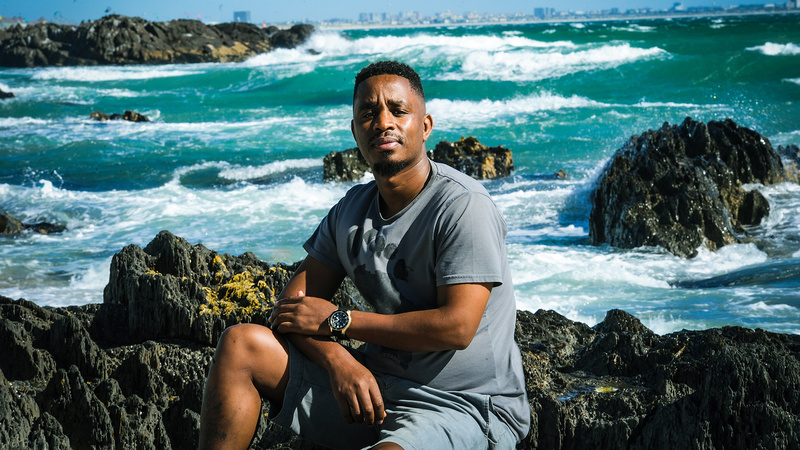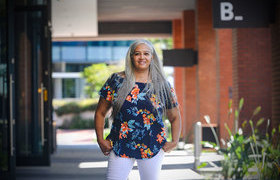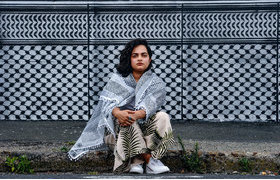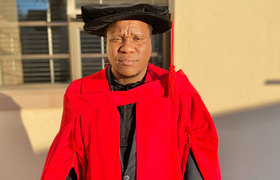PhD graduand becomes SA’s first black observational ocean biogeochemist
14 December 2021 | Story Niémah Davids. Photo Lerato Maduna. Read time 8 min.Mhlangabezi Mdutyana is a University of Cape Town (UCT) PhD graduate-in-waiting. He’s the son of a domestic worker and a security guard and he grew up on the dusty roads of Polar Park in Mthatha in the Eastern Cape.
The young man couch surfed his way through the first year of his MSc to make ends meet; and had his socks knocked off when his master’s was upgraded to a PhD. As if that wasn’t enough, when this first-generation graduand receives his doctoral degree on 14 December, he will make history as South Africa’s first black observational ocean biogeochemist.
Mhlangabezi’s story with UCT started in 2015 when he was awarded a scholarship to pursue his master’s in marine biogeochemistry. The Department of Oceanography in the Faculty of Science became his second home, and he was excited about his bright future. Admittedly, he was not prepared for what was beckoning on the horizon.
“Receiving word that my master’s would be upgraded to a PhD was unbelievable.”
“Receiving word that my master’s would be upgraded to a PhD was unbelievable. Ask anyone, this doesn’t happen in a hurry, and here, out of the blue it happened to me. I was in complete disbelief,” he said.
On Tuesday, 14 December 2021, Mhlangabezi will join hundreds of UCT graduands as they receive their degrees during a virtual graduation ceremony. And while there are many reasons to celebrate, he’ll also take a few moments to remember the long, hard haul.
Couch surfing
As a newbie in Cape Town, Mhlangabezi quickly realised that his master’s scholarship was not enough to pay his rent, buy food and pay for his transport to and from campus. He needed a new game plan and decided to get creative with his living arrangements.
“I spent the first year of my master’s on my friend’s couch. The arrangement worked well and meant that I could use my scholarship money for things I needed and not for rent, which took a huge chunk of the cash. I was blessed to have a friend who was willing to help me out,” he said.
But this arrangement changed when he received word that his MSc would be upgraded to a PhD. Owing to his unparalleled research, which at the time had been in a class of its own, Mhlangabezi became a doctoral candidate under the guidance and auspices of Dr Sarah Fawcett, a senior lecturer in the Department on Oceanography.
And with several scholarships – from the Harry & Doris Crossley Foundation; the National Research Foundation (NRF); and the Council for Scientific and Industrial Research (CSIR) – the troubles he had had just a few months prior were a thing of the past. Mhlangabezi tackled his PhD “boots and all”.
“I can safely say that I had a seamless PhD experience and it’s all thanks to Sarah [Fawcett]. Far too many PhD candidates feel that they aren’t 100% supported by their supervisors. But I can’t complain; having crossed paths with her was a blessing. Her support and guidance meant everything to me,” he said.
Novel research
Mhlangabezi explained that ocean biogeochemistry is the field of science that studies the carbon and nutrient transformation that occurs through biological, chemical, and geological processes. So, an ocean biogeochemist investigates the role marine organisms play in cycling carbon and nutrients in the upper ocean.
On the unique topic of his research, Mhlangabezi is modest but proud. He’s been on a quest to understand certain changes in the Southern Ocean, which is widely known for its nutrient, chlorophyl and iron concentrate imbalances, particularly in the upper ocean surface.
His research focused on the role that phytoplankton – the autotrophic components of the plankton community and a key part of ocean and freshwater ecosystems – and nitrifying bacteria play in removing carbon dioxide from the atmosphere. To reach his conclusions, he spent time aboard the SA Agulhas II research vessel in the Southern Ocean and collected seawater samples from up to 500 m deep to perform the necessary experiments.
“In the Southern Ocean, phytoplankton growth is limited by very low concentrations of dissolved iron, instead of the common limiting nutrient nitrogen. This is very important because it suggests that phytoplankton in the Southern Ocean is not operating at optimum capacity [and is] absorbing carbon dioxide from the atmosphere,” he said.
“Therefore, we are constantly looking for better ways to understand the role of phytoplankton and nitrifying bacteria during [the] carbon dioxide removal processes in the Southern Ocean.”
Transformation is crucial
On graduation day, Mhlangabezi’s PhD achievement will go down in the country’s history books when he becomes the first black South African to obtain a doctorate in this speciality field.
“I am beyond honoured. However, this also comes with an intrinsic responsibility on my part to help develop more black scientists in this field.”
“I am beyond honoured. However, this also comes with an intrinsic responsibility on my part to help develop more black scientists in this field,” he said. “I believe that UCT and other universities have a huge role to play in this process. They need to do a lot of work to attract, nurture and hold onto black researchers in scarce skills disciplines.”
But it’s also up to black scientists to do their bit in the areas they come from – paying it forward is an important part of the transformation process – in every field and on every level, he added. Working with children in both primary and high schools in under-resourced areas to increase their interest in scarce skills fields is one way of bridging the gap and to see the necessary changes in the long-term.
Stepping stone
Mhlangabezi said his PhD and the lessons he has learned along the way have paved the way for his future. And his journey with UCT doesn’t end at graduation. He has been awarded the University Research Committee’s (URC) Postdoctoral Research Fellowship Award and will kickstart his postdoctoral research fellowship in earnest in 2022.
His goal is to inspire young and upcoming black scientists and to contribute to nurturing and producing the next generation of exceptional black researchers “who look like me and who come from the communities I come from”. Supervising postgraduates will set the foundation for this important work. Therefore, planting his feet firmly in academia seems like a likely choice.
For now, he will enjoy the celebration that comes with graduation and the 2021 festive season.
Reflecting on how it all unfolded, it’s only fair that Mhlangabezi does a double take. There have been many surprising moments, and in a flash so much changed. But in the process, a lifelong dream has come true – for himself, his parents, his grandparents and their parents and he can’t help but smile at his achievement.
 This work is licensed under a Creative Commons Attribution-NoDerivatives 4.0 International License.
This work is licensed under a Creative Commons Attribution-NoDerivatives 4.0 International License.
Please view the republishing articles page for more information.











